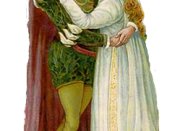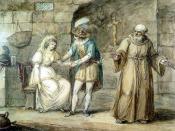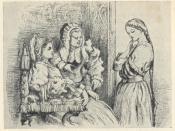I HAVE, previously had occasion to speak at large on the subject of the three unities of time, place, and action, as applied to the drama in the abstract, arid to the particular stage for which Shakspeare wrote, as far as he can be said to have written for any stage but that of the universal mind. I hope I have in some measure succeeded in demonstrating that the former two, instead of being rules, were mere inconveniences attached to the local peculiarities of the Athenian drama; that the last alone deserved the name of a principle, and that in the preservation of this unity Shakspeare stood pre-eminent. Yet, instead of unity of action, I should greatly prefer the more appropriate, though scholastic and uncouth, words homogeneity, proportionateness, and totality of interest,--expressions, which involve the distinction, or rather the essential difference, betwixt the shaping skill of mechanical talent, and the creative, productive, life-power of inspired, genius.
In the former each part is separately conceived, and then by a succeeding act put together;--not as watches are made for wholesale--(for there each part supposes a preconception of the whole in some mind)--but more like pictures on a motley screen. Whence arises the harmony that strikes us in the wildest natural landscapes,-- in the relative shapes of rocks, the harmony of colours in the heaths, ferns, and lichens, the leaves of the beech and the oak, the stems and rich brown branches of the birch and other mountain trees, varying from verging autumn to returning spring,--compared with the visual effect from the greater number of artificial plantations? --From this, that the natural landscape is effected, as it were, by a single energy modified ab intra in each component part. And as this is the particular excellence of the Shakspearian drama generally, so is...


